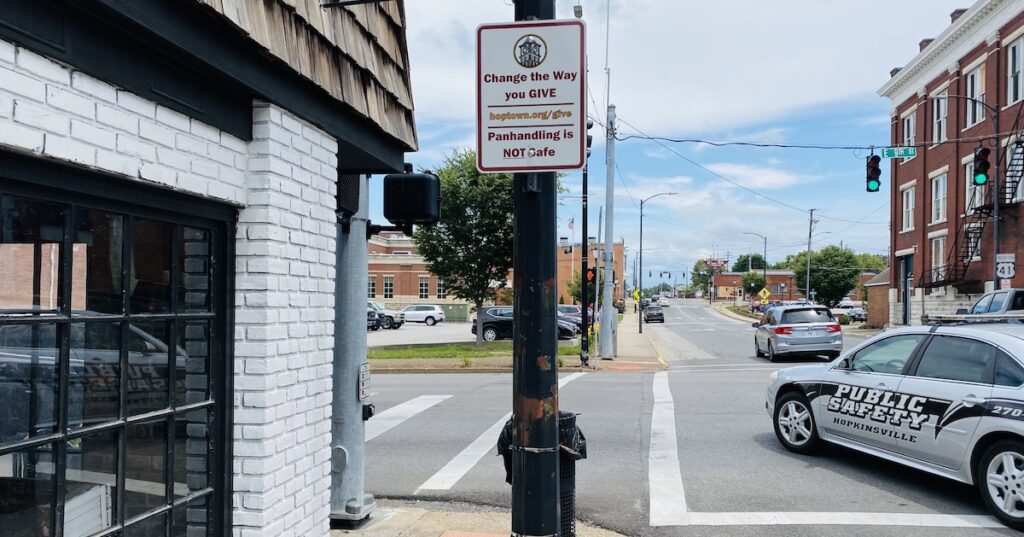When I heard Hopkinsville Mayor James R. Knight Jr. say the city will be posting “No Loitering” and “No Trespassing” signs at municipal properties, including parks, and that he wants local businesses to do the same in response to “squatters” all over town, I quickly imagined how awful that would look.
But was I missing something? Did he have a point? I decided to put the question to Hoptown Chronicle readers.

I asked for feedback Wednesday morning in our Daily Scoop newsletter, and within several hours I had responses from more than a dozen residents — almost all of them opposed to posting these signs but genuinely interested in addressing vagrancy and homelessness in Hopkinsville.
Andrew Wilson, who owns a real estate brokerage firm that he runs from a Main Street office in the heart of downtown, said he thinks signage would be short-sighted.
“The city has already posted signs about panhandling at the busy intersections downtown and folks still stand beside them and ask for money. I think we need a more long-term approach with a commitment from the city, local businesses and charitable organizations to address the problem,” Wilson wrote. “There has to be a fair and equitable solution that works for all, but it would take everyone coming to the table to agree on what the vision for downtown Hopkinsville will be.”
Knight, who took office in January, has been clear that he wants to focus on making Hopkinsville “safer and cleaner.” It’s part of a plan he calls “Growing Home.”
Others who responded said they would view “No Loitering” and “No Trespassing” signs as unwelcoming, especially to visitors that local businesses want to attract.
“I am appalled that we would put such unfriendly signs in our commercial areas,” wrote Karen Shields, a retired school principal who lives in one of Hopkinsville’s historic neighborhoods. “My mind starts to imagine what other signs will be next, once we accept these as normal.”
She questioned “the point” of these signs. Will violators be fined or incarcerated?
Jim Creighton, who makes custom furniture in the old Cayce-Yost Department Store building at 10th and Main streets and also lives in the historic district on Main Street, questioned if signs could even make a difference.
“The folks in question aren’t sign readers and law followers. I don’t own the sidewalk in front of our business and really don’t feel I have any authority over who’s out there,” he wrote.
Creighton, like Wilson, noted that signs discouraging panhandling at downtown’s two busiest intersections — Ninth and Main streets, and Ninth and Virginia streets — appear to do nothing to stop people from standing at those corners and asking for money.
Of course, those signs are aimed at people who would give money to panhandlers. A website address on the signs lists numerous alternatives to handing over cash to a panhandler.
I also heard from Donna Williams, a Methodist minister who runs a meal program for people struggling with poverty and homelessness in Hopkinsville. We’ve run several stories about Williams and the Dinner Church she started in 2019.
“If you don’t want homeless looking for a warm, dry place to be — build housing, fund shelters,” Williams wrote. “Find a place for them to go. Encourage business owners to support a shelter. Find an option — not a sign.”
It would be hard to find anyone at the grassroots level who is more informed about the issues. Williams is a former downtown business owner who could retire if she wanted. But instead she’s doing some heaving lifting for our community. She is on a first-name basis with many of the people who live on the streets or have inferior housing because they cannot afford anything else.
Another minister who responded said we need to think about how we react to homelessness.
Ron Hicks wrote, “When we see people in need as an inconvenience and an eyesore instead of being moved with compassion and try to help them change their situation, I think we become a city with a bunch of signs that will add more to our … police officers’ already busy plates and have a whole bunch of tickets, that will never be paid, that will lead to bench warrants, that will lead to even more problems for these people.”
Hicks wondered about the end goal.
“Maybe we waive the fine if they just move along, and we can pass this problem along to another town?” he wrote. “There — we’ve solved the homeless problem!”
Others told me they doubt signs will be effective.
“I don’t understand how signs will have any impact on lessening ‘the abundance of squatters.’ To me, these signs will just be eyesores,” wrote Tandy Coatney, a retired school guidance counselor.
Mary Dilly, a transplant from Central Kentucky who is new to Hopkinsville, said she appreciates any steps taken to address loitering and homelessness. She wants to see a campaign to clean up the city and tear down vacant houses.
“That would go a long way to drawing out the best of this sweet little town,” Dilly wrote.
I heard from Lynn Hazelrigg, a retired teacher who rehabs songbirds and other wildlife on a Christian County farm.
“I support the ‘no panhandling’ signs, but I do not support the ‘no loitering’ signs,” she wrote. “Our city needs to do more to provide shelter for homeless. Salvation Army cannot do it all. I’m glad they have hired a consultant to look into what can be done.”
The consultant Hazelrigg mentioned is Randall Gross, of Nashville. The mayor’s office has hired Gross to look at “all aspects” of homelessness, Downtown Renaissance Director Holly Boggess said during a community meeting I covered last month.
Several people who contacted me said they see how difficult it will be to address homelessness, especially given the mental health needs of many people who are living on the streets. But they also recognized how this affects local businesses.
And some indicated an interest in helping.
Suzy Schlegel, a retired occupational therapist who worked with patients at Western State Hospital, said she spoke to Knight on Friday at city hall, when the issue of homelessness came up during a legislative town hall that the mayor organized.
In a Facebook post, Schlegel wrote, “… if there is a way that a nonprofit organization can be established to help the homeless, I would be more than willing to volunteer. There has to be a way to help these people. Many people are a paycheck away from being homeless. It’s a growing problem in this country that no one wants to address.”
Problems stemming from homelessness are most evident downtown, so solutions need to come from downtown as well.
I’ve written a few times in recent years about the promise I see in downtown Hopkinsville’s revival. It was evident to me when we saw a surge in community pride and got serious about sprucing up to be Eclipseville in 2017, and it was there in one of the very first stories this news outlet published in the fall of 2018.
Many of my ideas about what downtown Hopkinsville can be are rooted in memories of the central business district when my family moved to Hopkinsville in the 1960s. Like me, Mayor Knight is old enough to remember when downtown was busier, cleaner and more relevant than it has been for the past couple of decades.
We are headed in the right direction. We have a mayor who wants to clean up the city. Many applaud him for that.
But signs that shout “No” are not the way to get there.
(Editor’s note: Jim Creighton, who commented for this story, serves on Hoptown Chronicle’s board.)
Jennifer P. Brown is co-founder, publisher and editor of Hoptown Chronicle. You can reach her at editor@hoptownchronicle.org. Brown was a reporter and editor at the Kentucky New Era, where she worked for 30 years. She is a co-chair of the national advisory board to the Institute for Rural Journalism and Community Issues, governing board past president for the Kentucky Historical Society, and co-founder of the Kentucky Open Government Coalition. She serves on the Hopkinsville History Foundation's board.





